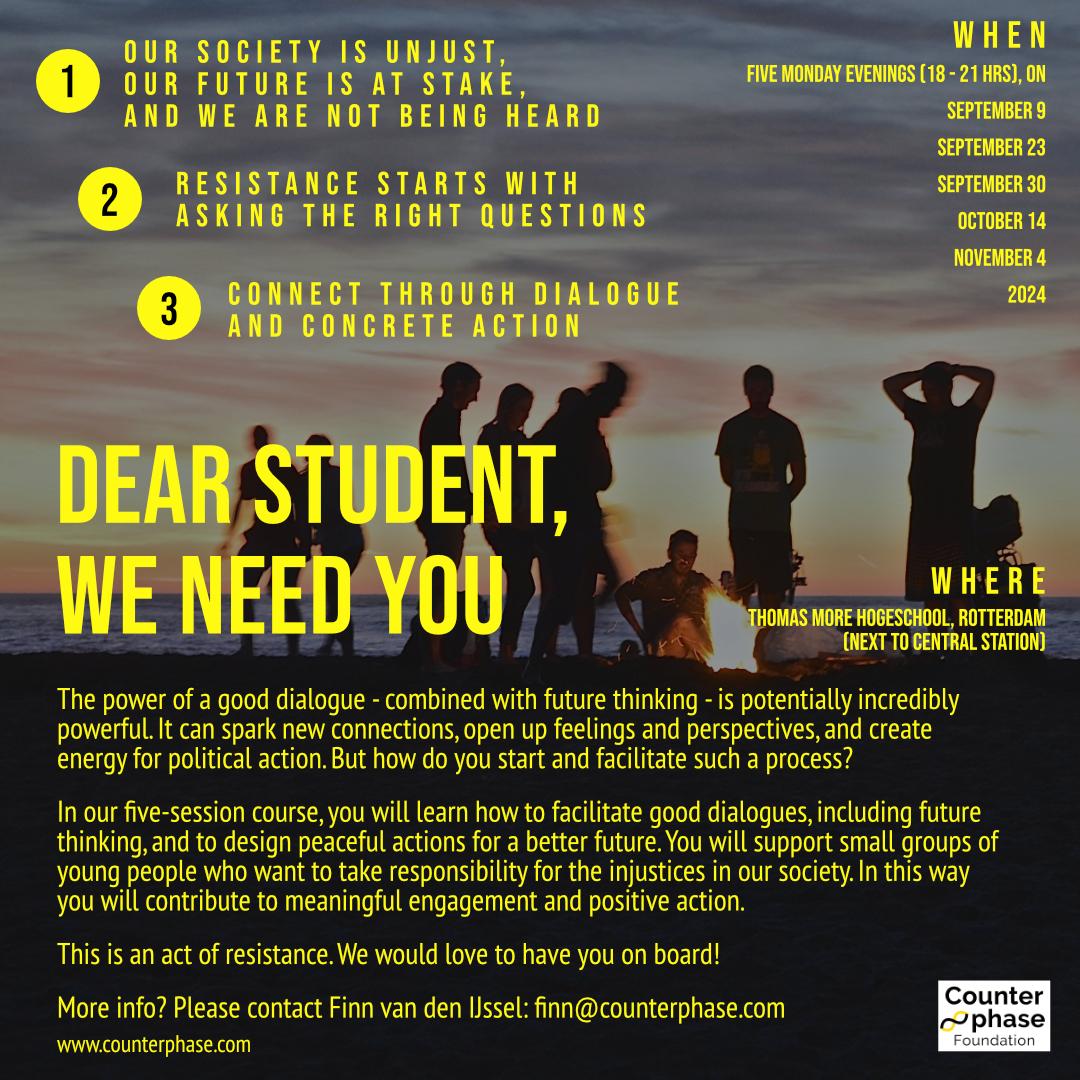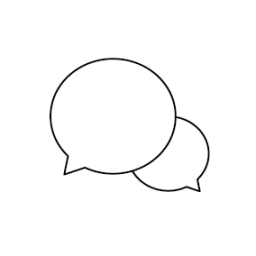Student training to facilitate youth assemblies
This training is developed for students who would like to facilitate youth assemblies. It will teach you both how to facilitate meaningful dialogues and future thinking among young people.
In a world of immense crises, it is extremely important that young people are not left alone, but that they have spaces to connect through their concerns and where they are being heard. As a facilitator, you actively encourage youth to engage with their feelings, interests and society at large, giving them the opportunity to be part of building a better world. This creates meaning and hope.

Through youth assemblies, youngsters learn to work together in small groups (3-5 persons), on themes and issues they want to explore. They learn to develop various future scenarios, research myriad prospects for action, and formulate policy advice. This can be done within or outside of the class and curriculum of any field of study, creating ‘free space’ where good dialogues can be held and connections can be made. Their facilitators possess the techniques of these processes and know when and how to step in. Students participating in this training learn to set up and facilitate small youth assemblies, and to promote the (online) collaboration between them.
History: Collaboration between Counterphase Foundation and Haags Montessori Lyceum
At the end of 2023, staff of Counterphase Foundation facilitated 90 3VWO students of the Haags Montessori Lyceum in The Hague. During eight 2-hour meetings, students collaborated in small groups, divided by theme. They developed future scenarios, recommendations and peaceful actions around self-chosen themes. This link gives an impression of the approach that was taken.
Learning goals
After this training you will be able to guide, facilitate and support youth in:
- Exploring and formulating their own relevant questions;
- Inquisitive dialogues following the short version of the Socratic method.[1] During these dialogues you guide students in finding new insights and prospects for action, with the help of questions they devised;
- Future thinking with the help of the eponymous toolkit[2] (scenario method);
- Channeling their drive to work together towards a better school, neighborhood, municipality, world.
As part of the training, participants will need to read some literature. During the meetings they will work together in practical exercises and practise dialogues. They will research meaningful questions, develop an inquisitive attitude, and gain several basic skills (see below).
Student-facilitators learn how to:
- provide clear guidelines and instruction to the participants
- structure, organize, and direct the collective thinking process while keeping an overview of the dialogue/process, and encouraging respect amongst participants
- encourage participants to think and speak freely and boldly
- lead by example, by
- valuing and inspiring the participants
- initiating engagement and collaboration
- having a critical, open, and inquisitive attitude
- listening carefully
- being able to consider the views, thoughts, and feelings of others
- keeping the dialogue on track and asking relevant questions
- speaking concisely and concretely
- ensure that participants reserve their judgments until after the session is over
- facilitate a natural flow of concepts while ensuring that participants do not skip phases or formulate answers prematurely
- bring about an environment in which the inquiry also entails a self-inquiry for the participants
- pose various kinds of guiding questions and give various forms of feedback
- distinguish between presuppositions
- adequately understand participants’ main concerns and formulate corresponding questions
- keep an eye on the group dynamic and be sensitive to both verbal and non-verbal communication
- bring about an atmosphere of trust and safety
- react appropriately to signals of discomfort or danger
- keep an appropriate distance from the participants
Practical information
The training consists of five sessions of three hours each (18-21hrs), between September and October 2024, on the following data at Thomas More Hogeschool in Rotterdam (next to central station).
- Monday, September 9, 2024
- Monday, September 23, 2024
- Monday, September 30, 2024
- Monday, October 14, 2024
- Monday, November 4, 2024
In addition to studying some literature, participants are expected to practice dialogues and independently review the toolkit future thinking. This preparation will take approximately three hours per meeting.
During the sessions there is ample room for questions. In addition, participants are free to ask questions to the trainer by mail or phone, both between the sessions and after completion of the training. The training – free of charge – is open to a maximum of 20 students and will be provided by Rudolf Kampers. Kampers educates teachers at Thomas More Hogeschool Rotterdam and in the rest of The Netherlands. He is co-owner of Leren Filosoferen and chairman of Counterphase Foundation. Together with Jan Ewout Ruiter, his companion at Leren Filosoferen, he wrote Filosoferen aan de keukentafel (Scriptum 2015) and the mentioned toolkits
Would you like to participate or have more information? Please send an email to Finn van den IJssel: finn@counterphase.com
[1] See toolkit Korte socratische dialoog, Kampers, R. & Ruiter, J.E., in Hoog spel. Filosoferen in de praktijk (red. Kessels, Ruiter, Stegmann), ISVW Uitgevers 2022
[2] See toolkit Toekomstdenken, Kampers, R., in Hoog spel. Filosoferen in de praktijk (red. Kessels, Ruiter, Stegmann), ISVW Uitgevers 2022

